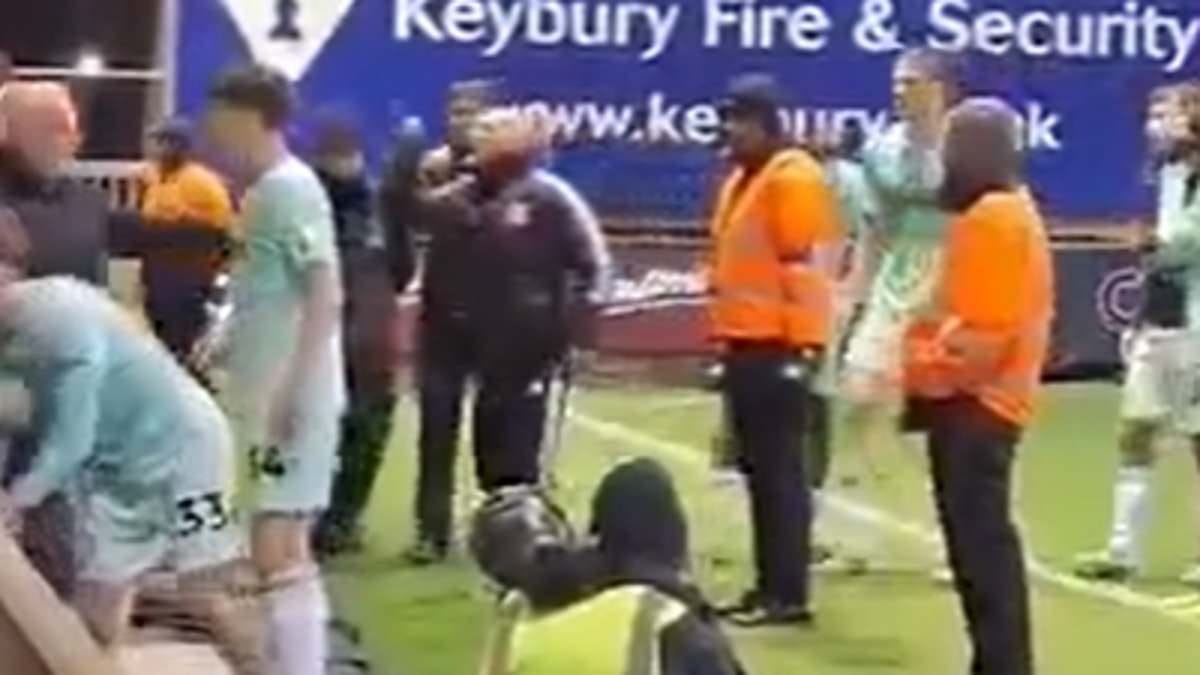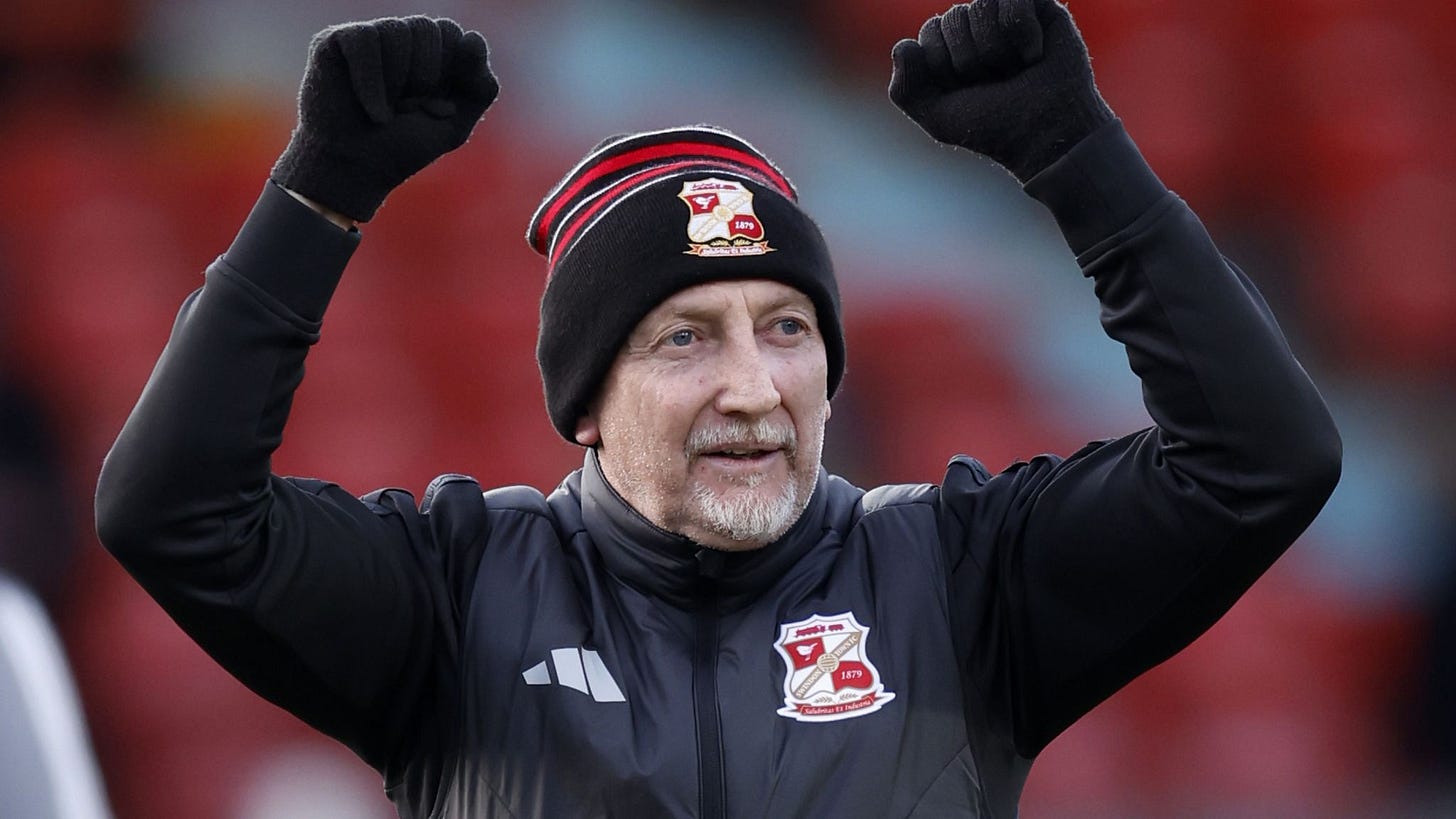Back in November, I wrote about being from Swindon and all that comes with it. It was a pretty downcast piece, as our town’s football club had hit a particularly low ebb, and optimism was in short supply.
We’d just lost 3-2 at home to Morecambe, one of the two sides below us in the table at that point, a calamitous performance in appalling conditions. Our manager, Ian Holloway, had only been in charge for six games, though by this point he’d already diagnosed the problem; the training ground was haunted.
This was par for the course for Holloway, a favourite with the media because of his love for a quip. The feeling was that “Ollie” would generate plenty of soundbites but probably not so many points.
The next league game after the Morecambe debacle saw us 4-0 down at Colchester United before half-time. Away at Bradford in December, Swindon didn’t manage a single shot at goal in the whole match, losing 1-0. A supporter complaining about the sorry state of affairs got into what typically gets referred to as a heated exchange with Holloway after the game, and the manager continued to rant about the fans in a post-match interview. It wasn’t going brilliantly.
We’d sunk to the very bottom of the table after the Colchester defeat, and the angry response from supporters reflected not just the 4-0 humiliation, but frustration at years of underperformance. Twenty-five years ago Swindon were a Championship team; since then, bar a couple of good seasons, the fare has been turgid, getting steadily worse every year.
For his part, Ian Holloway’s successes with Blackpool and Crystal Palace in the 2010s were also firmly in the rearview mirror; his most recent job was failure with Grimsby Town in 2020, and after four years out of work it was widely assumed he’d retired. Perhaps this was a case of a club and a manager out of time, any glory days long forgotten, being left behind by the world, sinking into non-league obscurity together.
But then, gradually but perceptibly, something changed. Three home wins in a row gave a bit of breathing space above the relegation zone. Some stodgy draws on the road hinted at greater solidity, and kept up a feeling of momentum. Bit by bit, the players began to play with more freedom and belief. Holloway was awarded “Manager of the Month” for January as we dragged ourselves up the table. Games at Carlisle and Fleetwood were won by four-goal margins. A 1-0 win at league leaders Walsall in March started talk of a late run to the play-offs; a bubble immediately punctured by four draws in a row. Not that that dampened Wiltshire spirits; at the weekend, a riotous 5-4 win over Bradford City took our run of unbeaten home games to thirteen; as I type this we have still not lost at the County Ground since that defeat to Morecambe in November, a run of form which would have been completely unimaginable at the time.
How has this happened? Holloway has managed to forge a real unity in the squad and around the club. Captain Ollie Clarke says he wishes he played for him ten years ago, such is the transformation he has brought. Tellingly, Clarke also talks about motivation; Holloway is the sort of manager who inspires a team, infuses them with belief and confidence. Players aren’t hiding on the pitch any more, they are encouraged to give it a good go and leave everything out there.
Fitness is another key plank of the Holloway transformation. Wins against Bradford and Wimbledon, and a draw against Cheltenham, have come via late goals. It speaks to the confidence in the squad that heads do not go down when we fall behind, as well as much improved fitness as our players are consistently out-running opponents up to the final whistle.
Finally, organisation has helped. Holloway has had to deal with a couple of dodgy keepers and various defensive injuries this term, but it is evident that players understand their roles and know what to expect. At Swindon’s level of football, there isn’t a vast discrepancy in terms of quality across the division; organisation, fitness, and motivation can make such a difference.
All of this explains why supporters breathed a huge sigh of relief when Holloway and the club recently agreed a contract extension through to 2028. Despite ongoing disquiet with the club’s owners, there is an air of positivity around Swindon which we’ve not experienced in a long time.
Holloway at Swindon feels like a great fit. He loves the area and is clearly enjoying life in charge, the fans are buying into him and what he is trying to do, and Swindon Town are a club with the stature, fan base, history and potential to be higher up the pyramid than the lower reaches of League Two. Most fans, if they were being honest, would admit that Swindon’s “natural home” is probably mid-table in League One, but we were a Championship club through the 1990s, and well-run clubs smaller than us have made it to the second tier in recent years; there is nothing to say we can’t get there again.
The suspicion remains that the club ownership will do something stupid; the length of time it took for the club to arrange a contract Holloway clearly wanted to sign caused some stress, and today he is frustrated at the lack of transfer funds. But the turnaround this season gives genuine cause for optimism. In recent weeks we’ve played the top five in the division, and not lost to any of them. There is well-founded belief that we can compete at the right end of the table next season.
So contrary to my previous piece, maybe it’s not over, for Ian Holloway or for Swindon Town. Wiltshire will have a league club again next year. We’ve got a team to be proud of again. But most of all we’ve got some hope back, a bit of optimism that this time next year, Rodney, we’ll be closing in on promotion and a hell of a party.
So, thanks Ollie. I underestimated you and I am extremely happy that you’ve proved me wrong.




